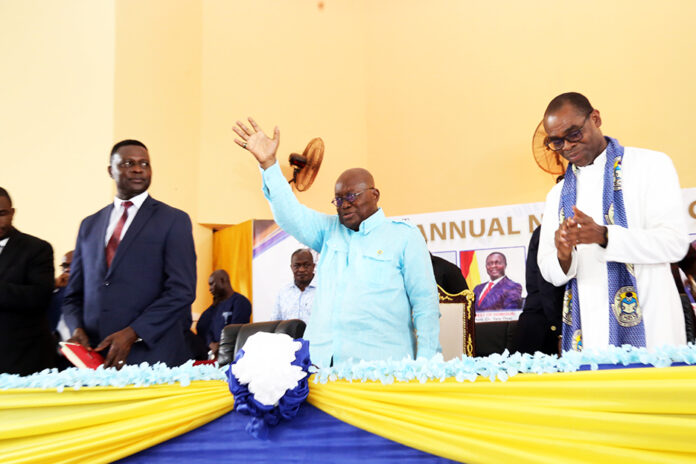
The President, Nana Addo Dankwa Akufo-Addo has chronicled the achievements of his government in the education sector, since he took office.
From kindergarten, through senior high school and tertiary, the president spent more time than usual, telling the story of the huge investment in the last seven years, which he said is changing the education system.

He was addressing the 61st Conference of Heads of Assisted Secondary Schools (CHASS) on Wednesday, October 11, 2023 at the Achimota School, Accra.
According to the president, he needed to leverage the conference to “set the records straight” and prove that he was working, contrary to claims by critics.
“I have to crave your indulgence for this long speech. There are people going around telling the people of Ghana that I have done nothing in the 7 years since I came to office. I thought this was a good opportunity for me to set the records straight,” he said.
The theme for the conference was: “61 years of shaping second cycle education in Ghana: The challenges and successes in contemporary times.”
The President argued forcefully that no government in the history of the 4th Republic had performed better for the growth of education than his administration, “and the numbers back this claim.”
SHS
According to him, over GH₡12.961 billion, out of the total budgetary allocation of over GH₡114.5 billion, had been spent on SHS.
He stated that 1,105 projects, including accommodation, teaching, and learning-related projects, have been initiated since 2017.

Giving further details, he noted that out of the total, 406 are classroom blocks of various types, science laboratories, and home economics blocks; 386 dormitories; 233 toilet facilities; and nine newly constructed model STEM SHS spread across the country.
The investment in the SHS level included the distribution of 280,000 laptops for teachers, 350 buses, 840 pick-up vehicles, and 677,470 pieces of furniture since 2017.
KG, PRIMARY, & JHS
The government, he said, was investing in early childhood education, including its teachers. He stated that, through the Ghana Education Trust Fund, 1,270 infrastructure interventions were being executed.
The primary and junior high schools have seen some investment through capacity building for their teachers and an infrastructure boost.
The President also added that the implementation of the national standardized tests for primary 2 and primary 4 pupils was a pivotal step towards assessing and improving learning outcomes.
He said that the Ministry of Education, collaborating with the West African Examination Council, has instituted serialization of examination papers for BECE and WASSCE to stop cheating and malpractice.
With the support of the Arab Bank for Economic Development in Africa, the president announced that 11 model schools were under construction currently under the model JHS project, aimed at strengthening the lower secondary level of education.
DIGITAL LITERACY
He further mentioned that the Ghana National Digital Literacy Project (NDLP) was ensuring that every student was equipped to thrive in the global digital economy. The primary schools are at the heart of the initiative.
The first phase focuses on establishing smart labs in 700 public schools, and the president announced that smart lab hardware has been delivered to 485 schools across the country.
Phase two of the NDLP, building on the initial, the president remarked, was to establish smart labs in each of the 27,064 schools across the country, and two teachers per school will be trained.
At the SHS level, the e-education component was to establish computer laboratories in 305 public SHS in the 16 regions of Ghana, the president noted.
STEM
The president’s address also touched on the investments being made in Science, Technology, Engineering and Mathematics (STEM).
Among other things, he said that the Ghana STEM Academy schools are at Abomosu, Awaso, Kpasenkpe, Bosomtwi Girls, Bosomtwi, Accra High School, and Kasoa Secondary Technical School.
He said that the government has completed the construction of ten regional STEM centres to train a complete STEM pipeline from primary through JHS to SHS. He added that six other centres are at 90% completion.
He mentioned the no-guarantor policy at the tertiary level and the collaboration with industries for student internships and capacity building as part of the investment in that area.
Meanwhile, the National President of CHASS, Rev. Stephen Owusu Sekyere, advocated for the purchase of buffer to return to the management of the schools due to what was insinuated as the inefficiency of the buffer stock to supply foodstuffs.
He also urged that to instill discipline and deal with hooliganism in SHS, the government should grant school authorities some powers to punish the indiscipline.







